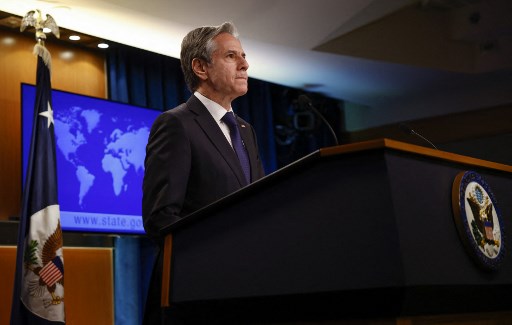
403
Sorry!!
Error! We're sorry, but the page you were looking for doesn't exist.
Secretary of State holds phone call with Israeli Defense Minister
(MENAFN) Just before the U.S. presidential election, Secretary of State Antony Blinken held a phone call with Israeli Defense Minister Yoav Gallant, focusing on U.S. commitment to defending Israel from Iranian threats. However, the bulk of the conversation addressed the dire humanitarian situation in Gaza, exacerbated by ongoing Israeli Defense Forces (IDF) operations in the northern Gaza Strip and the obstruction of humanitarian aid.
Three weeks earlier, Blinken, alongside U.S. Defense Secretary Lloyd Austin, sent a strongly worded letter to Israeli leaders urging them to take action within 30 days to alleviate Gaza's humanitarian crisis. They warned that failure to improve the situation could have significant consequences for future U.S. military assistance to Israel. In response, Prime Minister Netanyahu ordered the IDF to facilitate the delivery of 250 aid trucks daily, though this target has not been consistently met.
Meanwhile, Israel's Knesset passed legislation to shut down UNRWA offices, drawing criticism from the outgoing U.S. administration. Despite this, Blinken's primary concern remains the worsening humanitarian crisis in Gaza. He called on Israel to ramp up the delivery of essential aid—such as food and water—and also urged an end to the ongoing war, the release of hostages, and the creation of a path for Gaza’s civilians to rebuild their lives.
The call occurred roughly a month after the start of a significant IDF operation in the Jabalia refugee camp in northern Gaza, where nearly 1,000 militants were reportedly killed, and 700 residents suspected of affiliations with Palestinian groups were detained. Around 55,000 civilians were evacuated from the camp, but several hundred residents and Hamas fighters remained behind. Israeli officials stated that forced evacuations were necessary to protect civilians.
The IDF's actions have sparked growing criticism in both the U.S. and Europe, fueled by reports of mass civilian casualties and widespread infrastructure damage. This criticism intensified after the release of Israeli leaflets promoting a controversial "generals' plan," which advocated for the forced displacement of all Palestinians from northern Gaza to the southern half of the Strip under Israeli control. Senior Israeli officers behind the plan also suggested limiting the delivery of humanitarian aid to northern Gaza.
Three weeks earlier, Blinken, alongside U.S. Defense Secretary Lloyd Austin, sent a strongly worded letter to Israeli leaders urging them to take action within 30 days to alleviate Gaza's humanitarian crisis. They warned that failure to improve the situation could have significant consequences for future U.S. military assistance to Israel. In response, Prime Minister Netanyahu ordered the IDF to facilitate the delivery of 250 aid trucks daily, though this target has not been consistently met.
Meanwhile, Israel's Knesset passed legislation to shut down UNRWA offices, drawing criticism from the outgoing U.S. administration. Despite this, Blinken's primary concern remains the worsening humanitarian crisis in Gaza. He called on Israel to ramp up the delivery of essential aid—such as food and water—and also urged an end to the ongoing war, the release of hostages, and the creation of a path for Gaza’s civilians to rebuild their lives.
The call occurred roughly a month after the start of a significant IDF operation in the Jabalia refugee camp in northern Gaza, where nearly 1,000 militants were reportedly killed, and 700 residents suspected of affiliations with Palestinian groups were detained. Around 55,000 civilians were evacuated from the camp, but several hundred residents and Hamas fighters remained behind. Israeli officials stated that forced evacuations were necessary to protect civilians.
The IDF's actions have sparked growing criticism in both the U.S. and Europe, fueled by reports of mass civilian casualties and widespread infrastructure damage. This criticism intensified after the release of Israeli leaflets promoting a controversial "generals' plan," which advocated for the forced displacement of all Palestinians from northern Gaza to the southern half of the Strip under Israeli control. Senior Israeli officers behind the plan also suggested limiting the delivery of humanitarian aid to northern Gaza.

Legal Disclaimer:
MENAFN provides the
information “as is” without warranty of any kind. We do not accept
any responsibility or liability for the accuracy, content, images,
videos, licenses, completeness, legality, or reliability of the information
contained in this article. If you have any complaints or copyright
issues related to this article, kindly contact the provider above.


















Comments
No comment